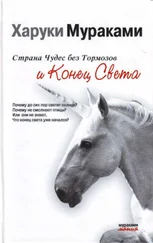Murakami, Haruki - Харуки Мураками
Здесь есть возможность читать онлайн «Murakami, Haruki - Харуки Мураками» весь текст электронной книги совершенно бесплатно (целиком полную версию без сокращений). В некоторых случаях можно слушать аудио, скачать через торрент в формате fb2 и присутствует краткое содержание. Год выпуска: 2014, ISBN: 2014, Издательство: Knopf Doubleday Publishing Group, Жанр: Старинная литература, на английском языке. Описание произведения, (предисловие) а так же отзывы посетителей доступны на портале библиотеки ЛибКат.
- Название:Харуки Мураками
- Автор:
- Издательство:Knopf Doubleday Publishing Group
- Жанр:
- Год:2014
- ISBN:9780385352116
- Рейтинг книги:5 / 5. Голосов: 1
-
Избранное:Добавить в избранное
- Отзывы:
-
Ваша оценка:
- 100
- 1
- 2
- 3
- 4
- 5
Харуки Мураками: краткое содержание, описание и аннотация
Предлагаем к чтению аннотацию, описание, краткое содержание или предисловие (зависит от того, что написал сам автор книги «Харуки Мураками»). Если вы не нашли необходимую информацию о книге — напишите в комментариях, мы постараемся отыскать её.
Харуки Мураками — читать онлайн бесплатно полную книгу (весь текст) целиком
Ниже представлен текст книги, разбитый по страницам. Система сохранения места последней прочитанной страницы, позволяет с удобством читать онлайн бесплатно книгу «Харуки Мураками», без необходимости каждый раз заново искать на чём Вы остановились. Поставьте закладку, и сможете в любой момент перейти на страницу, на которой закончили чтение.
Интервал:
Закладка:
The five of them had been classmates at a public high school in the suburbs of Nagoya. Three boys, and two girls. During summer vacation of their freshman year, they all did some volunteer work together and became friends. Even after freshman year, when they were in different classes, they remained a close-knit group. The volunteer work that had brought them together had been part of a social studies summer assignment, but even after it ended, they chose to volunteer as a group.
Besides the volunteer work, they went hiking together on holidays, played tennis, swam at the Chita Peninsula, or got together at one of their houses to study for tests. Or else—and this was what they did most often—they just hung out someplace, and talked for hours. It wasn’t like they showed up with a topic in mind—they just never ran out of things to talk about.
Pure chance had brought them together. There were several volunteer opportunities they could have chosen from, but the one they all chose, independently, was an after-school tutoring program for elementary school kids (most of whom were children who refused to go to school). The program was run by a Catholic church, and of the thirty-five students in their high school class, the five of them were the only ones who selected it. To start, they participated in a three-day summer camp outside Nagoya, and got to be good friends with the children.
Whenever they took a break, the five of them gathered to talk. They got to know each other better, sharing their ideas and opening up about their dreams, as well as their problems. And when the summer camp was over, each one of them felt they were in the right place, where they needed to be, with the perfect companions. A unique sense of harmony developed between them—each one needed the other four and, in turn, shared the sense that they too were needed. The whole convergence was like a lucky but entirely accidental chemical fusion, something that could only happen once. You might gather the same materials and make identical preparations, but you would never be able to duplicate the result.
After the initial volunteer period, they spent about two weekends a month at the after-school program, teaching the kids, reading to them, playing with them. They mowed the lawn, painted the building, and repaired playground equipment. They continued this work for the next two years, until they graduated from high school.
The only source of tension among them was the uneven number—the fact that their group was comprised of three boys and two girls. If two of the boys and two of the girls became couples, the remaining boy would be left out. That possibility must have always been hanging over their heads like a small, thick, lenticular cloud. But it never happened, nor did it even seem a likely possibility.
Perhaps coincidentally, all five of them were from suburban, upper-middle-class families. Their parents were baby boomers; their fathers were all professionals. Their parents spared no expense when it came to their children’s education. On the surface, at least, their families were peaceful, and stable. None of their parents got divorced, and most of them had stay-at-home mothers. Their high school emphasized academics, and their grades were uniformly good. Overall there were far more similarities than differences in their everyday environments.
And aside from Tsukuru Tazaki, they had another small, coincidental point in common: their last names all contained a color. The two boys’ last names were Akamatsu—which means “red pine”—and Oumi—“blue sea”; the girls’ family names were Shirane—“white root”—and Kurono—“black field.” Tazaki was the only last name that did not have a color in its meaning. From the very beginning this fact made him feel a little bit left out. Of course, whether or not you had a color as part of your name had nothing to do with your personality. Tsukuru understood this. But still, it disappointed him, and he surprised himself by feeling hurt. Soon, the other four friends began to use nicknames: the boys were called Aka (red) and Ao (blue); and the girls were Shiro (white) and Kuro (black). But he just remained Tsukuru. How great it would be, he often thought, if I had a color in my name too. Then everything would be perfect.
Aka was the one with the best grades. He never seemed to study hard, yet was at the top of his class in every subject. He never bragged about his grades, however, and preferred to cautiously stay in the background, almost as if he were embarrassed to be so smart. But as often is the case with short people—he never grew past five foot three—once he made up his mind about something, no matter how trivial it might be, he never backed down. And he was bothered by illogical rules and by teachers who couldn’t meet his exacting standards. He hated to lose; whenever he lost a tennis match, it put him in a bad mood. He didn’t act out, or pout—instead, he just became unusually quiet. The other four friends found his short temper amusing and often teased him about it. Eventually Aka would always break down and laugh along with them. His father was a professor of economics at Nagoya University.
Ao was impressively built, with wide shoulders and a barrel chest, as well as a broad forehead, a generous mouth, and an imposing nose. He was a forward on the rugby team, and in his senior year he was elected team captain. He really hustled on the field and was constantly getting cuts and bruises. He wasn’t good at buckling down and studying, but he was a cheerful person and enormously popular among his classmates. He always looked people straight in the eye, spoke in a clear, strong voice, and had an amazing appetite, seeming to enjoy everything set down in front of him. He also had a quick recall of people’s names and faces, and seldom said anything bad about anyone else. He was a good listener and a born leader. Tsukuru could never forget the way he’d gather his team around him before a match to give them a pep talk.
“Listen up!” Ao would bellow. “We’re going to win. The only question is how and by how much . Losing is not an option for us. You hear me? Losing is not an option! ”
“Not an option!” the team would shout, before rushing out onto the field.
Not that their high school rugby team was all that good. Ao was clever and extremely athletic, but the team itself was mediocre. When they went up against teams from private schools, where players had been recruited from all over the country on athletic scholarships, Ao’s team usually lost. “What’s important,” he’d tell his friends, “is the will to win. In the real world we can’t always win. Sometimes you win, sometimes you lose.”
“And sometimes you get rained out,” Kuro remarked, with typical sarcasm.
Ao shook his head sadly. “You’re confusing rugby with baseball or tennis. Rugby’s never postponed on account of rain.”
“You play even when it’s raining?” Shiro asked, surprised. Shiro knew next to nothing about sports, and had zero interest in them.
“That’s right,” Aka said seriously. “Rugby matches are never canceled. No matter how hard it rains. That’s why every year you get a lot of players who drown during matches.”
“My God, that’s awful!” Shiro said.
“Don’t be silly. He’s joking,” Kuro said, in a slightly disgusted tone.
“If you don’t mind,” Ao went on, “my point is that if you’re an athlete you have to learn how to be a good loser.”
“You certainly get a lot of practice with that every day,” Kuro said.
Shiro was tall and slim, with a model’s body and the graceful features of a traditional Japanese doll. Her long hair was a silky, lustrous black. Most people who passed her on the street would turn around for a second look, but she seemed to find her beauty embarrassing. She was a serious person, who above all else disliked drawing attention to herself. She was also a wonderful, skilled pianist, though she would never play for someone she didn’t know. She seemed happiest while teaching piano to children in an after-school program. During these lessons, Shiro looked completely relaxed, more relaxed than Tsukuru saw her at any other time. Several of the children, Shiro said, might not be good at regular schoolwork, but they had a natural talent for music and it would be a shame to not develop it. The school only had an old upright piano, almost an antique, so the five of them started a fund-raising drive to buy a new one. They worked part-time during summer vacation, and persuaded a company that made musical instruments to help them out. In the spring of their senior year, their hard work finally paid off, resulting in the purchase of a grand piano for the school. Their campaign caught people’s attention and was even featured in a newspaper.
Читать дальшеИнтервал:
Закладка:
Похожие книги на «Харуки Мураками»
Представляем Вашему вниманию похожие книги на «Харуки Мураками» списком для выбора. Мы отобрали схожую по названию и смыслу литературу в надежде предоставить читателям больше вариантов отыскать новые, интересные, ещё непрочитанные произведения.
Обсуждение, отзывы о книге «Харуки Мураками» и просто собственные мнения читателей. Оставьте ваши комментарии, напишите, что Вы думаете о произведении, его смысле или главных героях. Укажите что конкретно понравилось, а что нет, и почему Вы так считаете.











